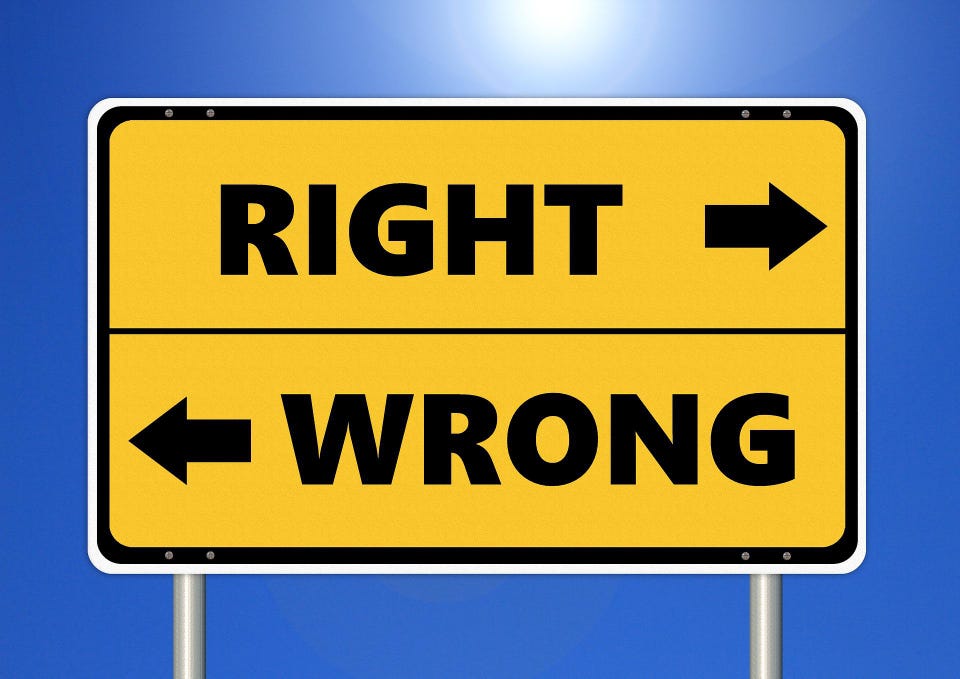AI AI Ethics: Why You Should Care Nisha Talagala Contributor Opinions expressed by Forbes Contributors are their own. Entrepreneur and technologist in AI Following New! Follow this author to stay notified about their latest stories. Got it! Sep 5, 2022, 10:52pm EDT | Share to Facebook Share to Twitter Share to Linkedin Sign – Right or Wrong Pixabay A typical day.
You get up in the morning and an AI tells you that traffic to work is heavy this AM. You read your curated newsfeed where an AI has selected what news articles you may find interesting. Product and movie recommendations follow you online.
These are the AIs that you see. Behind the scenes, AIs are able to evaluate your health, your work history, your credit rating, and more. Your smartwatch provides recommendations on everything from breathing to exercise – and as technology races forward – will know not just your heart rate but your blood sugar history.
For every human, some of these are conveniences and some are privacy intrusions. This is where AI Ethics comes in. The confluence of sensor technology, the internet, massive computational resources, and AI – have led to a world where companies may know more about you than your family and friends (and maybe even more than you know about yourself!).
As an illustrative example – researchers at Mount Sinai discovered that COVID-19 can be detected by a smartwatch well before any test . The value of such innovation is clear, but the risk less so. AI Ethics is the field of determining how to use such technology responsibly.
Hopefully, the above examples illustrated why everyone should care about AI Ethics. In the rest of this post, we describe in more detail what AI Ethics is and how you can be part of the human-wide conversation about Ethical AI. What are the different aspects of Ethical AI? AI Ethics encompasses many areas at the intersection of technology, privacy, and human values, just to name a few.
Some areas are: How can humans trust an AI? AI Trust (frequently mentioned in the same breath as AI Bias) is the area of Ethics which focuses on the need for AIs that are fair. Humans need to be convinced that decisions made by an AI are “fair” and do not favor or disfavor some groups inappropriately. The problem is that fairness itself is a subjective concept that humans do not agree on.
Where humans do not agree – it is not possible for a computer program to please all. AI, Privacy, and Human Data. Between the internet and the growth of sensors, monitoring devices are everywhere.
The last decade of AI has demonstrated that personal data can be used for everything from recommending books to detecting diseases. But who has the right to say what is allowed and what is not? The conversation about AI and privacy has already begun, with laws in the GDPR and others introducing clauses that e mpower individuals to control how corporations use private data . Data marketplaces are emerging, driving the control (and monetization) of personal information from the companies to individuals .
AI impact on our environment. As AI models become bigger and bigger, the amount of resources they consume also gets bigger. Studies have shown that just one training of a large language AI model consumes as much energy as five cars in their lifetime (and these models do not just train once – they retrain many many times).
On the other hand, AI is showing promise in helping the environment , in everything from greenhouse gas emission detections to finding novel enzymes that can eat plastics . The AI technology race. Every nation (and many companies) is realizing that their competitive advantages lie in their citizens becoming AI literate.
To get an edge in AI technology, nations are investing in everything from data to compute machinery. What does this mean for the future of small economies vs. large ones? Will the larger economies amass so much AI knowledge and dataset resources that it will create yet another gap? AI and Weapons.
A recent study showed that AI’s creation abilities are not limited to art and poetry. In under six hours, an AI was able to create hundreds of potential chemical weapons . Why should you care? Like most transformative technologies, what AI will become in the future depends on decisions made by humans.
As a technology, AI is capable of solving or causing our biggest problems. MORE FOR YOU Black Google Product Manager Stopped By Security Because They Didn’t Believe He Was An Employee Vendor Management Is The New Customer Management, And AI Is Transforming The Sector Already What Are The Ethical Boundaries Of Digital Life Forever? What can you do? AI Ethics is likely to be everyone’s responsibility. From individuals to corporations, there are many things you can do.
Become AI Literate Understand the responsible AI practices as they apply to your industry. Understand the tools available to govern your personal information and that of your families. Encourage the next generation to learn AI Ethics and become AI Literate.
Follow me on Twitter or LinkedIn . Nisha Talagala Editorial Standards Print Reprints & Permissions.
From: forbes
URL: https://www.forbes.com/sites/nishatalagala/2022/09/05/ai-ethics-why-you-should-care/



